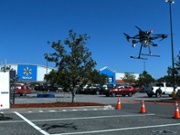|
|
 
|
Top Stories
|
The US services sector stagnated in September, with the Institute for Supply Management's index falling to 50, indicating no growth. Business activity contracted for the first time since May 2020, and new orders barely expanded. Employment in the sector shrank for the fourth consecutive month, though at a slower pace. Prices paid by service providers rose to one of the highest levels in three years, reflecting the impact of tariffs and supply chain challenges.
|
|
|
While the wholesale distribution sector is not immediately affected by the shutdown, the ongoing suspension of agency operations and economic data releases poses risks for the industry. Distributors rely on timely information like construction spending and employment data for business planning. If the shutdown persists, the halt of routine OSHA inspections and suspension of E-Verify and contract compliance programs could create operational challenges.
|
|
|
Walmart has adopted Wiliot IoT Pixel devices that leverage ambient power sources like radio waves to digitize its supply chain. These ambient IoT tags, which do not require batteries, are being connected to Walmart's AI-driven systems to deliver detailed, real-time insights on pallet locations and inventory status. The technology's ambient nature allows for scalable and energy-efficient tracking, reducing manual processes and enabling automated alerts that improve operational efficiency.
|
|
|
|
Operations and Technology
| |
 |
| (Anadolu/Getty Images) |
Walmart has now completed over 300,000 drone deliveries, doubling its total since June, and is moving beyond small-scale tests to make drone delivery a key part of its last-mile logistics, said Greg Cathey, the retailer's vice president of transformation and innovation. While only a small number of Walmart's 4,600 US locations offer drone delivery, the company is rapidly expanding operations in cities like Tampa, Fla., Orlando, Atlanta, Charlotte, Houston and Northwest Arkansas, in partnerships with Wing and Zipline.
|
|
|
Despite operating in a prolonged freight downturn, C.H. Robinson Worldwide has increased operating profit this year through a lean operating model, streamlined operations and AI integration that has automated daily rate quotes. Machine learning and generative AI handle half the company's carrier bookings and appointments, enabling it to respond to all quote requests and increase win rates. CEO Dave Bozeman, who took over last year, says the company is exploring agentic AI to handle complex logistics decisions and further boost efficiency, particularly in global forwarding.
|
|
|
|
Sales and Marketing
|
Despite the rapid evolution of marketing channels, technologies and techniques, the foundational principles of B2B marketing have persisted, David Dodd writes. Drawing from E. Jerome McCarthy's 1960 introduction of the 4Ps model, Dodd argues that while surface-level practices may shift, the underlying concepts, such as understanding customer needs and coordinating company offerings to satisfy them, remain as relevant now as they were decades ago
|
|
|
|
The Business Leader
|
US GDP grew 3.8% in Q3, while employment and hours worked stagnated, raising the possibility of a productivity boom driven by generative AI, writes Greg Ip. AI adoption has been rapid, but its impact on overall productivity is still emerging, asserts Ip, who analyzes the effects of factors such as the deglobalization of the economy and workforce demographics.
|
|
| |
 |
| (Sturti/Getty Images) |
The rise of AI, cloud computing and edge technologies is driving the need for skilled workers to build and maintain digital infrastructure. This "new-collar" workforce, which includes electricians, welders and HVAC technicians, is essential for the growth of data centers and related facilities. "New-collar" jobs typically do not require a four-year college degree but do call for intense training, problem-solving skills and adaptability.
|
|
|
|
NAW Insider
Prioritize your organization's greatest asset — your people. NAW's premier education programs, such as the online Management Academy and the in-depth Distribution Leadership Program at THE Ohio State University, are designed to equip your high-potential employees with the skills and insights they need to lead and succeed. Ensure your rising stars are prepared to drive your business forward by investing in their growth today. Learn more about how NAW can help you develop the leaders of tomorrow. |
|
|
|
About NAW
| The National Association of Wholesaler-Distributors (NAW) is one of America’s leading trade associations, representing the $8 trillion wholesale distribution industry. Our industry employs more than 6 million workers throughout the United States, accounting for approximately 1/3 of the U.S. GDP. 250,000 wholesale distribution companies operate across North America, including all 50 states. Learn more. |
|
|
|
|
| Got this from a friend? Subscribe now and stay in the loop! |
|
 |
|
| |
| Take advantage of every opportunity and if you don't give up, hopefully you find a way -- that message I've taken around the world. |
Jane Goodall,
primatologist, ethologist, anthropologist
1934-2025 |
|
| |
 |
|
|
|
|
|
|
|
|
| Copyright © 2025 SmartBrief. All Rights Reserved. A division of Future US LLC. |
| Full 7th Floor, 130 West 42nd Street, New York, NY, 10036. |
|
|
|
